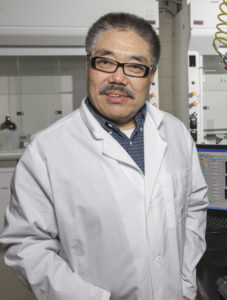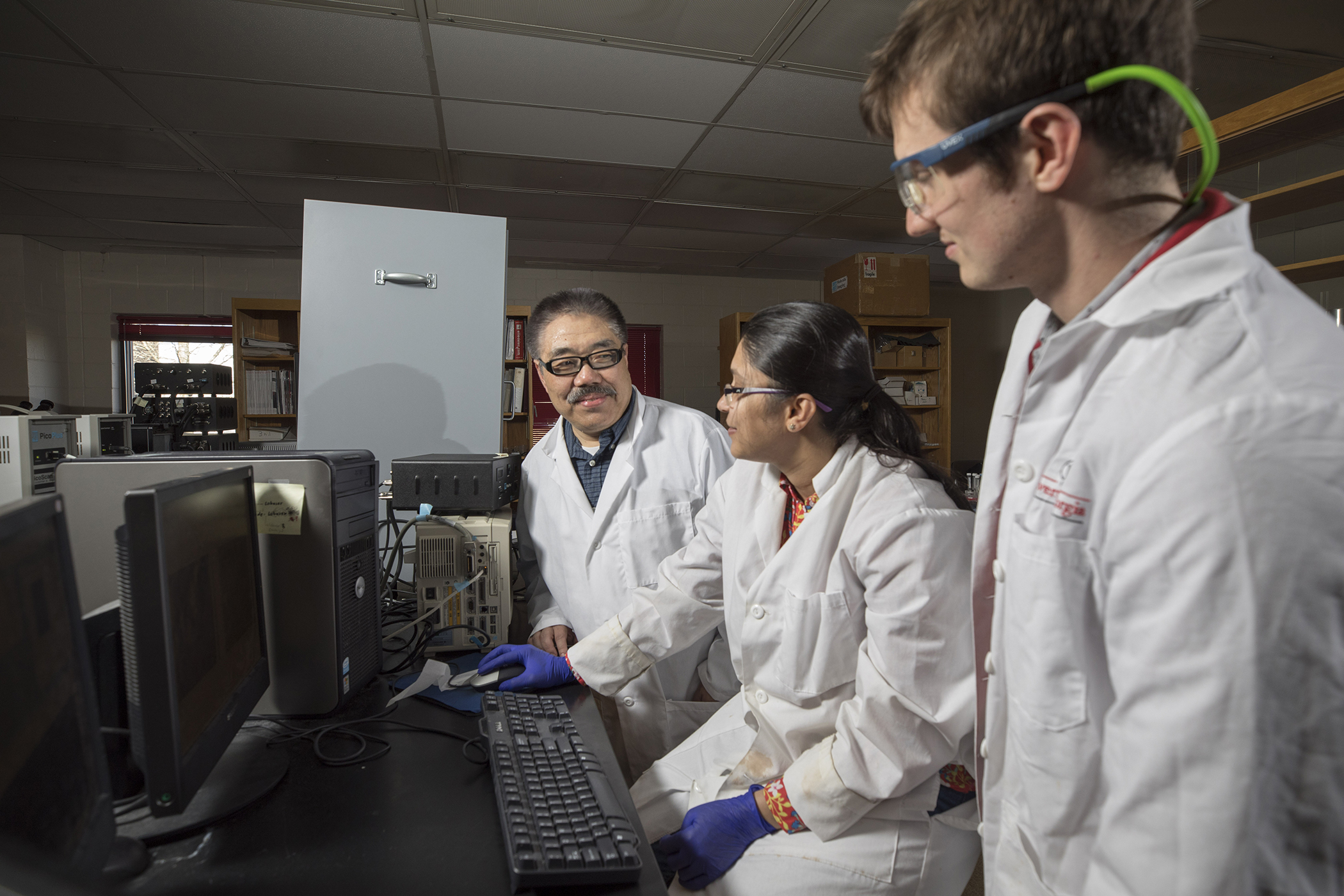Bingqian Xu, a professor in the College of Engineering, conducts research at the scale of single molecules while giving students a big-picture perspective on how they can apply their knowledge and skills to solving today’s challenges.
Where did you earn degrees and what are your current responsibilities at UGA?
I earned my Ph.D. degree in materials science and engineering from Arizona State University. At UGA, I am a professor in the School of Electrical and Computer Engineering in the College of Engineering. I also have a courtesy appointment with the department of chemistry and the department of physics in the Franklin College of Arts and Sciences. I teach engineering courses for the ECE degree programs. My research group tries to figure out how things work at the single-molecule level.
When did you come to UGA and what brought you here?
I came to UGA in January 2006, the only spring start time offered while other universities offered fall start dates. However, the foremost reason I decided to join UGA was the excellent research and teaching environment on campus, particularly the unique opportunities to contribute to the establishment of the UGA College of Engineering.
What are your favorite courses and why?
I really enjoy teaching the undergraduate/graduate split level course “Introduction to Nanoelectronics.” It is one of my areas of research and expertise, and it is usually new to our students. I like to introduce the students to this new field of research and encourage them to read the research papers and comb out a topic to present to the class. I am really impressed by how the students organize the presentations and put everything in the context of what they learned in the class.
What are some highlights of your career at UGA?
Establishing a world-leading lab in single molecule study that produced high-quality research papers in journals such as Nature Chemistry, Nature Communications, Journal of the American Chemical Society, and Angew. Chem. These efforts helped me earn the 2017 UGA College of Engineering Award for Excellence in Research. I am also very grateful for our campus and the national and international research collaborations I established that greatly promote our research.
How do you describe the scope and impact of your research or scholarship to people outside of your field?
My single molecule studies try to reveal how things work and function at the level of a single molecule. Single molecule study is where science and engineering met, and it applies the tools and measurement techniques of nanoscale physics and chemistry to generate remarkable new insights into how physical, chemical and biological systems function. First, single-molecule measurements provide important information that is “averaged out” in ensemble results. Second, by conducting many sequential measurements, they allow one to determine the distribution of molecular properties and investigate the inhomogeneous systems. Finally, they permit observation of rarely populated transients that are difficult or impossible to capture using conventional methods. This detailed understanding will reveal the structure-function relationship that is needed in many applications in new materials developments for new energy, molecular devices and biotechnology.

How does your research or scholarship inspire your teaching, and vice versa?
Engineering teaching is a technology-transfer activity, the outcome of which will enable my students to competently tackle open research questions and/or produce useful solutions for real engineering problems. Research enables us to push the limits of knowledge farther, and teaching helps us prepare minds for research. Therefore, my overall teaching strategy is to address what the student will achieve at the end of instruction, rather than simply the delivery of subject material in a structured manner. I believe that this will help to enhance the quality of research and simultaneously complement professional growth: both my own, and that of my students.
What do you hope students gain from their classroom experience with you?
I hope the students learn about unique new viewpoints that not only clarify many old questions but also provide a powerful approach to new questions at the frontier of modern nanoscale science and technology, such as how devices can be built to control the spin of electrons. I also try my best to encourage critical thinking and emphasize communication skills throughout my courses. This way, I hope they will develop knowledge sets and skills that will serve them throughout their careers.
Describe your ideal student.
My ideal student should be not only curious, motivated, engaged and hard-working, but also grateful, passionate and humble, and wants to know how things work at nanoscale.
Favorite place to be/thing to do on campus is…
Being the first one to come and last one to go almost every day in my office building, I spend most of my time on campus in my lab. I also enjoy showing my visitors around the beautiful North Campus and Sanford Stadium.
Beyond the UGA campus, I like to…
Do yard work. It is always relaxing and a good refresher from the research work.
Community/civic involvement includes….
Serving in the church by teaching Sunday school and leading a Bible study and fellowship group. I also often offer to help the new students and scholars moving by providing and driving my F-150.
Favorite book/movie (and why)?
My favorite movie is “The Lion King,” especially the music — “You raise me up.” It is so encouraging.
The one UGA experience I will always remember will be…
There are many unforgettable moments. If I had to name only one, that would be making the world’s smallest diode out of single DNA and publishing it in Nature Chemistry. The paper was ranked third in the top 10 of 2016 Nature Chemistry publications.


